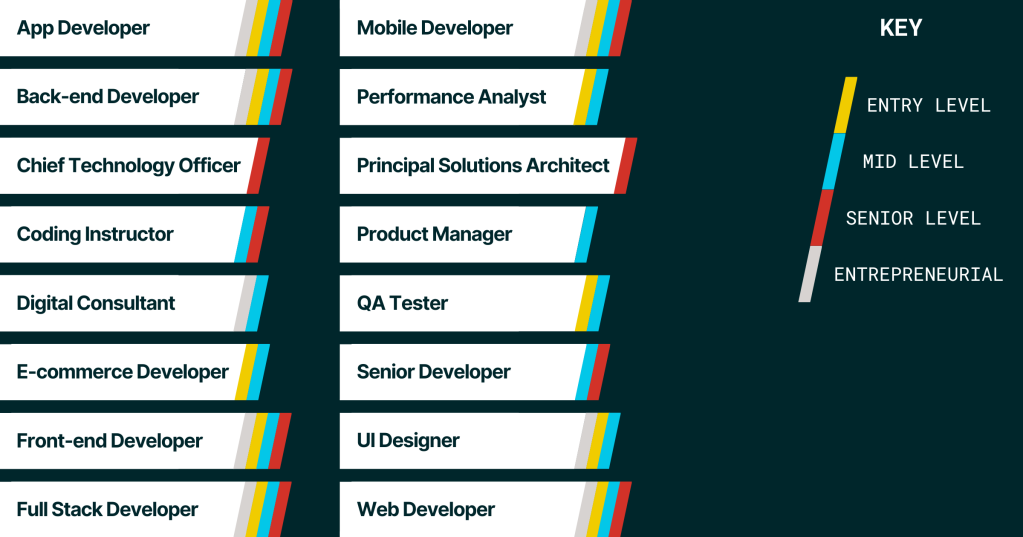Advancements in and adoption of technology have allowed for the coding industry to expand and move with the times. As a coding professional, you will join a cutting edge field that is constantly evolving, thus placing you on a path of lifelong learning and allowing you to gain access to a range of career opportunities.
Not convinced yet? Here are a few data points to give you an idea of what the industry has to offer and where it’s heading.

Let’s review this skill set together by discussing how coding expertise can be acquired, applied, and transformed into a fulfilling career.
What can I do with coding skills?
The responsibilities of coding professionals can vary, but they all revolve around creating products that meet the needs of users and stakeholders. Here are three common responsibilities found in the job descriptions of coding professionals:
Create the technical structure of websites — Add functionality and user-friendliness to websites by building layouts, interactive elements, data layers, and API integrations.
Actualize the design of websites — Collaborate with designers and content creators to bring the vision of a website to life.
Manage data — Set up programs, tools, and databases to manage and pull data.
Test and debug — Test, fix, and revamp website functionality and design in order to meet quality control standards and user needs.
To know where your skill set fits within the industry, sometimes all it takes is a little research. Listen as Front-End Developer Nishtha Arora shares her experiences in the industry and how she got there:

I come from a consulting background where I’ve worked in a non technical environment. I was always curious about how the technicality of things work, how exactly the background of things happen, how software’s built and things like that. So, I was at a point where I was getting a chance to do a career change. And, so, I decided I’ll go into a technical field and learn about how things are built. And that’s where I did my boot camp from U.T. Austin and learned web development there. And my first job was working at Match.com for building their website in technologies.
Discover your career opportunities
Acquiring basic coding skills opens up a wide range of career opportunities around the world.

You may be wondering, what is the difference between a front-end developer, a back-end developer, and a full stack developer? Well, we have your answer!
Front-end developer — Programs the front-end of the web product, otherwise known as the portion that users see and interact with.
Back-end developer — Programs the back-end of the web product, otherwise known as the portion that supports the front-end by providing dynamic functionality and data management.
Full-stack developer — Works on both the front-end and back-end of a web product.
Now that you understand these fundamentals, you are equipped to explore other job titles and career paths in the coding industry.
Expert advice
“When it comes to coding, I have people get creative in their search by focusing on the skills they are interested in. For example, if you like working with React, scour any job description that contains that. This will diversify the types of titles that you see. You may come across ‘solutions engineer’ and realize that it makes sense for you.”
— Corey Bott, career expert at edX

How can I acquire coding skills and turn them into a career?
If you’re interested in pursuing your own career in the coding industry, we recommend taking these steps:
Research is key when it comes to any career, and a career in coding is certainly no exception. Take advantage of all the information that’s out there, whether it’s through surfing the internet for job titles, listening to industry-specific podcasts, or getting connected to professionals in the areas or positions that interest you.
Pro tip:
Explore your career’s possibilities. As part of your research, take every opportunity to learn more about topics in your desired field. Browse the edX course catalog at edx.org to see what coding-related topics, courses, and programs interest you and start advancing your career in coding today.
One key part of the research phase is networking. This simple step is often overlooked and undervalued, but can have a significant impact on your career trajectory. If you want to get clear on your career goals and aspirations, you must take time to talk with professionals about what the work actually looks like.
By reaching out to professionals in your targeted fields, positions, and companies, you open a door of opportunity in your own career. It is invaluable to connect with coding professionals who could vouch for you and gain hard-to-find intel about the industry or organizations of interest.
Pro tip:
We highly recommend scheduling informational interviews (interviews for the purpose of learning and connecting) with coding professionals and hiring managers as a way to gather information. These are people that can help you learn new skills, offer advice, and share job opportunities with you.
Check out our Networking Guide and Outreach Templates and Resources for help getting started.
To supplement your understanding of what others are doing professionally, make sure to get clear on your own goals and aspirations. Ask yourself if the coding industry is what interests you, or if it’s just coding functions within another industry. The possibilities are endless.
Unless they are targeting a very specific role or project, the majority of aspiring coding professionals start with the most popular coding skills and technologies. It is a strategy worth considering because it increases the pool of job postings that you qualify for.
Use the list below to determine which popular skills match your interests.
Front-end technologies — JavaScript, HTML, CSS, React.js, Angular
Back-end technologies — Python, JavaScript, Node.js, Django, Go, Rust
Full-stack technologies — MERN stack, MEAN stack, MEVN stack, LAMP stack
Data technologies — SQL, NoSQL, MySQL, PostgreSQL, MongoDB
Pro tip:
Another way to identify which skills match your career aspirations is to look at job postings that interest you. Take note of the skills and technologies that are listed in the descriptions. These are the skills that will qualify you for these roles in the future.
There are a variety of mediums through which you can learn coding skills. Consider which route best fits your needs and learning-style. Here are a few options to consider:
Self-education — If you are looking to learn asynchronously, informally, or casually, self-education is a great place to start. There are many approaches to this style of learning that support various career goals, budgets, learning styles, and time commitments. Here are some ways to self-educate in coding:
- Informal opportunities: Gain a greater understanding of the industry by reading. Explore books, articles, and even research papers to expand your coding knowledge and learn what’s happened or is happening in the field. Not a reader? There are plenty of videos, podcasts, and other forms of multimedia that can teach you a thing or two about careers or work related to coding.
- Online courses: If you prefer a more structured or socialized learning experience, online courses might be well-suited. edX.org offers several instructor-led and self-paced coding courses that may be of interest.
- Professional certifications: When you want a less casual learning experience, but don’t have needs that warrant a boot camp or degree, professional certifications may be the best fit for you. Professional certifications are a great addition to your resume and prove your technical skills for roles in coding. edX.org offers many certificate programs within the field of computer science that may interest you.
Boot camps — These innovative programs are designed by experienced curriculum teams to help you achieve your career goals in a fraction of the time it takes to complete a traditional degree. With many boot camps lasting just 3–12 months, you’ll be amazed at how quickly you can gain the knowledge and expertise you need to launch your dream career. Explore popular coding boot camps on edX.org.
Computer science degree — Pursuing a degree in computer science means diving deep into the fascinating world of web and computer technologies! It’s an excellent choice if you want to gain a comprehensive understanding of the rich history, intricate theories, mathematical concepts, and cutting-edge innovations that have contributed to shaping the technologies we rely on today.
The technical hiring process is different from those of non-technical fields in two ways:
First, many employers require a portfolio of projects, such as course projects, personal projects, and professional projects. You’ll want to build a competitive online portfolio that highlights your skills and unique value.
Second, many technical hiring processes involve a technical screening. This is a stage in the interview process where the employer assesses a candidate’s technical skills. They might sound intimidating at first, but remember that the employer wants you to succeed. They are hoping to find a great candidate and that candidate could be you.
Helpful resources:
The career team at edX has resources and workshops to help you fine-tune your application materials and prepare for technical interviews. Start with our Technical Screening Guide.
Once you get your foot in the door of the industry, make sure to celebrate your success. The career journey is full of ups-and-downs and we believe that every victory deserves acknowledgement.
With that said, your journey doesn’t end here — it’s only just beginning. Give yourself grace and understand that careers are not linear. Here are some of the ways that you could continue growing within the coding industry:
Continued learning — Always make sure to reference our course catalog on edX.org for continued learning opportunities. Now that you’ve secured a career in coding, it never hurts to brush up on your skills, expand your knowledge within the industry, or learn about other subject matters that could apply to your work, interests, or something in between.
Promotions — Career advancement in coding looks a little different than other industries. Coding professionals advance in their careers via two pathways: a technical track and a management track.
Promotions in coding:
Here are some titles of roles that you could grow into as you advance your career in coding:
Technical track: Advance by deepening your knowledge and technical skills. Examples: Senior Developer, Principal Solutions Architect, Lead Software Engineer, Principal Software Engineer
Management track: Advance by assuming people and project management responsibilities. Examples: Chief Technology Officer, Senior Engineer Manager, Director of Delivery Management, Technical Lead
- Pivots — Make sure to regularly check in with yourself and your satisfaction with daily tasks. If you find yourself disinterested in your current role, take stock of the things you like and dislike about it, keep your eyes out for company-sponsored growth opportunities, and pursue career pivots that optimize your background, skill set, and interests.
What could my career look like with a coding skill set?
It is difficult to say exactly what your life would look like as a coding professional, but we do have some metrics about the realities of the industry. Consider how these may factor into your life plan:
Remote work opportunities — According to StackOverflow (2022), 85% of coding professionals say that their organizations are at least partially remote.
Wide range of options — Startups, medium-sized companies, and large companies all need coding professionals. As a coding professional, you can find the right fit for you. And don’t forget that you have the option to freelance or become an entrepreneur!
Competitive salaries — Coding professionals are in demand and their salaries reflect this. Check it out for yourself by researching salaries in your region.
Sarah Kineer’s life in coding
“I’m doing a lot of different things every day. I’m working with engineering, product, marketing, implementation, and sales. I’m also a tech resource and accessibility expert at my company.”
— Sarah Kineer, solutions engineer

What are my next steps?
Learn about coding:
Register for a course on edX to learn about a variety of topics within the coding industry, such as Intro to HTML and Developing Front End Apps with React.
Watch a session:
Watch a relevant session on our Events page to learn more about the industry and other professionals’ experiences within it.










